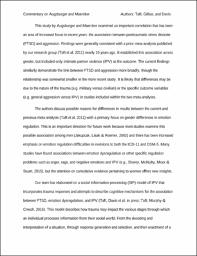
ATTENTION: The works hosted here are being migrated to a new repository that will consolidate resources, improve discoverability, and better show UTA's research impact on the global community. We will update authors as the migration progresses. Please see MavMatrix for more information.
Show simple item record
| dc.contributor.author | Taft, C.T. | |
| dc.contributor.author | Gilbar, O. | |
| dc.contributor.author | Davis, Maxine | |
| dc.date.accessioned | 2020-07-16T21:08:47Z | |
| dc.date.available | 2020-07-16T21:08:47Z | |
| dc.date.issued | 2020 | |
| dc.identifier.issn | 0969-5893 | |
| dc.identifier.uri | http://hdl.handle.net/10106/29281 | |
| dc.description.abstract | **Please note that the full text is embargoed** ABSTRACT: This study by Augsburger and Maercker examined an important correlation that has been
an area of increased focus in recent years: the association between post-traumatic stress disorder (PTSD) and aggression. Findings were generally consistent with a prior meta-analysis published
by our research group (Taft et al, 2011) nearly 10 years ago. It established this association across
gender, but included only intimate partner violence (IPV) as the outcome. The current findings similarly demonstrate the link between PTSD and aggression more broadly, though the
relationship was somewhat smaller in the more recent study. It is likely that differences may be
due to the nature of the trauma (e.g. military versus civilian) or the specific outcome variables
(e.g. general aggression versus IPV) in studies included within the two meta-analyses. [This is a post-print of an article published by Wiley in Journal of Clinical Psychology: Science and Practice on February 10, 2020, available online: https://onlinelibrary.wiley.com/doi/full/10.1111/cpsp.12327?af=R.] | en_US |
| dc.language.iso | en_US | en_US |
| dc.publisher | Wiley | en_US |
| dc.title | Commentary on Augsburger and Maercker: Posttraumatic Stress Disorder and Aggression: What the Data Tells Us and Where We Go from Here | en_US |
| dc.type | Article | en_US |
| dc.identifier.doi | 10.1111/cpsp.12327 | |
Files in this item
- Name:
- Trauma-PTSD-Aggression-Women-M ...
- Size:
- 119.2Kb
- Format:
- PDF
- Description:
- PDF
This item appears in the following Collection(s)
Show simple item record


